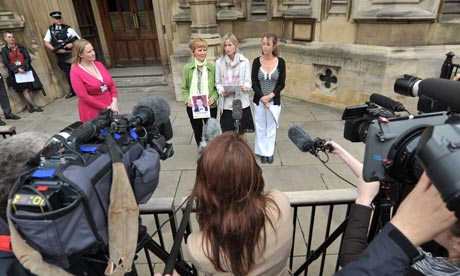|
Kate McCann tells
parliamentary group that victims of burglary get more help than families
whose children are missing
 |
|
Kate McCann, the mother of missing Madeleine McCann (C)
poses with parents of missing children Sarah Godwin (L) and
Nicki Durbin (R) outside the Houses of Parliament on Monday.
Photograph: Ben Stansall/Getty Images
|
Madeleine McCann's mother
has claimed some victims of burglaries can receive get more emotional,
legal and practical support than families whose children are missing,
who may get nothing. Giving evidence at a Commons inquiry organised by
the all-party parliamentary group on runaway and missing children and
adults, Kate McCann said the sense of helplessness felt by families was
"overwhelming".
Despite her medical
training, she simply "could not function" when her daughter, then almost
four, went missing from their apartment in Praia da Luz, Portugal, in
May 2007. "It was the first time in my life when I felt out of control."
Counselling had helped "to talk, to vocalise our fears and to challenge
our fears," she said.
McCann told the committee
she did not think it should be left to grieving parents to search for
their child, and she called for a single point of contact between
families of the missing and police. "To be left in the dark when your
child is missing and at risk is unbearable."
Human beings are not
equipped to deal with such ordeals and more support is crucial if
"families are to survive".
She went on: "Many people
have been worn down by this process because it's absolutely relentless
and exhausting."
But she added that now
Scotland Yard is involved in her daughter's case: "I feel the chances of
her being found are improving".
Speaking outside the
Commons before the hearing, she said: "If your house is burgled, you are
automatically offered victim support with emotional, practical and legal
assistance. If your child goes missing, you may get nothing. This
parliamentary inquiry has the potential to change that."
Last month McCann, from
Rothley, Leicestershire, published a book about her daughter's
disappearance, to renew efforts to find her.
The official Portuguese
inquiry into the disappearance of Madeleine was formally shelved in July
2008, although private detectives employed by the McCanns have continued
the search.
MPs heard how families
often felt they as if they were being a nuisance to officers, and were
often treated as if they were wasting police time, and were left in the
dark by police.
Chief constable Nick
Gargan, chief executive of the National Policing Improvement Agency
(NPIA), said: "There wouldn't be a police officer in this country who
wouldn't change the way they deal with missing persons if they'd
listened to the evidence session I've just listened to."
Forces receive 356,000
reports relating to 200,000 missing people each year ? the equivalent of
one report every 90 seconds, Gargan said.
Up to 80% of those reported
missing return home within 24 hours. But between eight and 35 people are
found dead each week after being reported missing, he told the MPs.
Of those who went missing,
52% were male, 48% female and two in three were young people who were
under 18, he said.
Martin Houghton-Brown,
chief executive of the charity Missing People, said: "From dealing with
finances, insurance policies, bank accounts and mortgages through to
having a missing person declared presumed dead, families left behind
often struggle to deal with institutions that have no system for their
clients going missing.
"This inquiry is a landmark
opportunity for parliamentarians to ensure that families are able to
access the full range of support that they so desperately need."
He told the MPs that up to
20,000 families a year could benefit from the support provided by the
Missing People charity, but many were unaware that that help was there
Houghton-Brown called for
police forces to let the families of missing people know that the
charity was there and some support was available.
Home Office minister James
Brokenshire, who also gave evidence to the inquiry, said: "We are
acutely aware of the pain caused when a loved one goes missing and we
are working hard to ensure the best arrangements are in place to support
families.
"We continue to work
closely with the voluntary sector, providing additional funding for the
valuable work of the charity Missing People, which provides a lifeline
to missing people and their families through its helpline and wider
support services."
From next month, the Child
Exploitation and Online Protection agency will take over responsibility
for missing children, further improving the service that families of
missing children receive, and providing further specialist support to
police forces in missing children cases.
Kate McCann was joined by
Sarah Godwin ? whose son, Quentin, was 18 when he went missing in New
Zealand while on his way to an after-school job on 20 May 1992; and
Nicki Durbin, whose son, Luke, 19, went missing four years ago.Ann
Coffey, chairwoman of the all-party parliamentary group on runaway and
missing children and adults, said the MPs were examining what emotional,
practical and legal support those families need to help them cope at
such a traumatic time |


